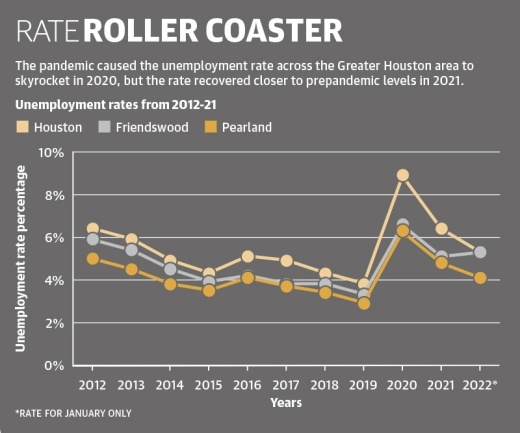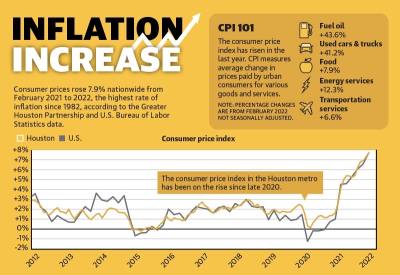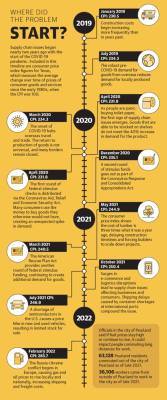Additionally, the ongoing conflict in Europe caused by Russia invading Ukraine in late February has added a new variable that has caused fuel prices to rise, experts said.
Businesses in the Pearland and Friendswood area have needed to adjust how they run their daily operations, business owners said.
“Supply chain is a challenge as businesses try to locate and receive raw materials and goods to produce products here in our community,” Pearland Chamber of Commerce President Jim Johnson said. “Businesses have felt it due to issues with ports and, more recently, there have been some minor concerns with additional costs of shipping associated with increasing fuel prices.”
Overall, the Houston area’s economy has recovered and rebounded from shutdowns, oftentimes resulting in more demand than there is supply, said Patrick Jankowski, senior vice president of research for the Greater Houston Partnership.
“We shut everything down in March and April of 2020, and we realized we didn’t need to shut it down,” Jankowski said. “So things started opening back up, and that’s when we saw the first surges in growth. The last quarter of 2021 was just incredibly strong. It was the strongest quarter on record for job growth.”
Brian Malone, vice president of the Pearland Economic Development Corp., mirrored the sentiment shared by Jankowski. Pearland and the Greater Houston area saw unemployment rates begin to decrease again after the initial shock of the pandemic as early as August 2020, Malone said.
With businesses fully operational, they need as many hands as they can get, Jankowski said. However, businesses have not been able to pick up where they were at prior to March 2020. The labor force in Pearland is vastly different from two years ago, , Malone said.
Additionally, there is also the ongoing rise in inflation. A February inflation update from the U.S. Bureau of Labor Statistics reported the consumer price index rose 7.9% nationwide from February 2021 to February this year. The CPI measures the average change in the prices paid by urban consumers for a variety of consumer goods and services.
People have begun to land more jobs nationally. The bureau reported an increase in job creation in February with the total nonfarm payroll employment rising by 678,000 nationally and the unemployment rate falling to 3.8% nationwide. This influx of job opportunities has left businesses competing for workers, Malone said.
“Whereas they used to be able to post a job and have 30 people come in and apply, now they will have three,” Malone said. “It has dropped that drastically.”
Ongoing challenges
Many of the issues businesses are facing are related to the supply chain—the flow of goods from the producer to the customer—which was essentially halted when the pandemic first hit and nations ceased trading and shipping, Jankowski said.Although many ports have opened back up, COVID-19 outbreaks and the rise in gas and oil prices still threaten this system, at times leaving business owners wondering when they will get their next shipments in, including in the Pearland and Friendswood area, officials said.
February survey data from the Federal Reserve Bank of Dallas revealed 64.7% of Texas business owners were still being impacted by supply chain disruptions or delays in mid- to late February.
One such business is Gold’s Gym, the international fitness brand. Gold’s Gym is slated to open a new center in Friendswood this summer but has needed to remain flexible with the location’s construction due to supply chain issues that could arise, said Matt Radmanovich, the head of brand public relations for RSG Group, which represents Gold’s Gym.
“All of our machines are manufactured in Germany with a company called Gym80, and we ship them in containers across the sea,” Radmanovich said in an email. “Getting spots on those cargo boats in containers has been a challenge and has required extensive planning.”
The rise in prices and supply chain issues have affected multiple industries. From a consumer perspective, it affects every resident in the city because they must pay more for goods and services while manufacturers have to raise their prices or overcompensate for the delayed times and lack of resources, Malone said.
AJ Jaser, owner of Stomp’s Burger Joint, said rising costs and limited supplies have made producers shift the way they buy products. Stomp’s Burger Joint is a local chain with three locations in the South Houston area, including one in Pearland.
“Prices have been volatile and very uncertain as to the future and how it will look; many people are changing their models,” Jaser said in an email.
HCA Houston Healthcare, which has 13 Houston-area hospitals, including one in Pearland, has seen similar challenges with securing optimal supply levels, said Brad Vicknair, HCA Houston Healthcare’s supply chain chief operating officer.
Because of the hospital system’s size, it can ensure its facilities have the supplies needed and can reach out for resources across the state or nation if needed, Vicknair said. However, HCA Houston Healthcare has also seen its vendors set allocation limits for certain products, such as silicone, Vicknair added.
Alongside supply chain disruptions are staffing shortages. Local business leaders agreed people have come to expect higher pay for what are coined “behind-the-counter” jobs.
The GHP reported there are around 92,000 fewer workers in the Houston region now than a year ago.
“The pandemic has changed how people work,” Johnson said. “I think there are opportunities out there for those that want to seek employment to obtain employment.”
Looking ahead
While staffing shortages and access to supply lines are unfavorable, the economy is bouncing back, Jankowski said. The GHP reported about 316,700 of the region’s 361,400 lost jobs had been recovered as of the end of 2021.“No one thought the economy would rebound as strong as it has,” Jankowski said.
While the unemployment rate decreases and businesses across the region revert back to normal functions as before, an attitude adjustment in the labor force continues to have major effects, Malone said.
“All of our manufacturers right now are back to normal in the sense that they have hired people back; many of them have grown just because their product markets have grown,” Malone said. “The biggest challenge that our folks face has been finding a quality workforce.”
Dissatisfaction with commute times, flexibility and pay rates has made retaining employees an issue at times, Malone said.
Like other health care organizations, HCA Houston Healthcare has also experienced increased staffing challenges due to the COVID-19 pandemic, such as people leaving the field to take care of loved ones, resigning from burnout or changing careers, said David Wagner, CEO of HCA Houston Healthcare Pearland. Cities and businesses alike, including those in Pearland, have started to adapt to the mentality change and are seeking to increase job retention while also funneling quality candidates.
“We are proactively recruiting nurses and nurse technicians and offer numerous benefits for those who join our organization, including a nurse residency program, tuition reimbursement, employee assistance program with mental health services and professional development programs,” Wagner said.
One of the things the PEDC is in the early process of implementing is hiring a workforce director, who will be tasked with working with businesses, schools and colleges to develop not only the workers, but also relationships with the workforce, Malone said. However, no one knows how long the issues with the workforce will last, he said.
“It’s just a different world,” Malone said. “I think everybody is sitting here and waiting to see what happens.”







